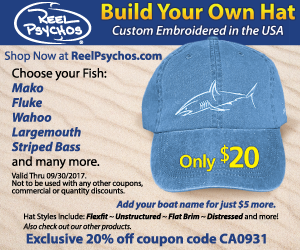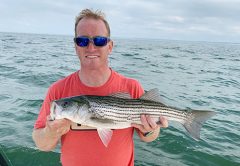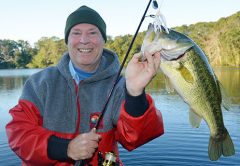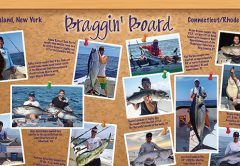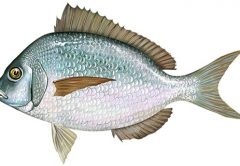I shudder to think the number of folks I’ve watched come and go over almost 20 years working deck—party and charter boats—in Point Jude. Especially during these lean times, I start to consider the number of times I was present for charter-fishing misfires, trips that ended badly, never quite congealed, or turned out just “okay” when they could have been spectacular. More times than I care to count, these short-circuited or ill-fated trips were the result of predictably (at least from my perspective) mismatched combinations of charter and captain. Chemistry affects every human interaction for better or worse, and the world of so-called “deep-sea” fishing is no exception. From my humble vantage as a lowly deckape, I’ve bitten my lip more than once as I watched a captain do his damnedest to give a group a good day on the water, his efforts doomed to fail because he simply failed to understand their expectations—the specific criteria feeding their unique, highly-subjective definition of fishing success.
I’ve seen trips when charter groups tuned the fish, yet still walked off the dock, a smirk on every face. And on the opposite end of the spectrum, charters thrilled with a day despite a conspicuous lack of fish in the boxes—the latter case clear evidence that there’s more than one measure of a good day’s fishing. The key concept is that it’s well worth taking your time as you shop for the right boat and crew, given your expectations for. What follows is a quick look at some ways to find the right match, while avoiding common pitfalls.
Honest Assessment
The first thing, before you even begin looking for a good charter boat, is to take stock of your group’s strengths and weaknesses. The highliner charter captain, even as he shellacks most of the fleet more days than not, may be a great choice for your neighbor, a fanatical fisherman who’s charter-fished since he was a kid. That same skipper, though, could make your trip a quick preview of the eighth circle of hell.
Often, boats that return to port with loads of monster fish day after day sacrifice some measure of customer orientation to put up the kinds of numbers they do. At the risk of insulting charter-boat customers, one of the biggest variables a skipper faces is the experience level of the anglers in his cockpit, and—there’s no nice way to say this—every angler he’s had on board in an average week will see himself as the type of fisherman who makes light work for captain and crew. And, ironically, you’ll often prove a greater liability with each year you’ve had to form habits, which add a step to the skipper’s and mate’s workload: Before they can teach you their way—as they would with amateurs—they must first “un-teach” you your way.
Each captain does things his/her own way, and you won’t always know the reasons he/she does them one way as opposed to another. One good friend who runs charters for trophy bass almost exclusively prefers that customers never hold the trolling rods, leaving them in the rod holders. This practice has nothing to do with his anglers—he gauges by the action of the tip on his port-side rod whether lures are swimming properly, and at the right depth. Bottom line is that he’s spent so many years refining his techniques that customers’ attempts to “help” generally hinder his efforts to put fish in the boat.
If you have extensive experience, you may be better off choosing a captain who’s open to “customizing” trips in terms of tackle and tactics, or perhaps jumping on an “open” headboat. The best bet—without exception—is to follow the age-old “When in Rome” wisdom, regardless of whose boat you charter. If you find yourself in a clash of egos with the skipper because he’s not giving you your due, it is you who should check your ego at the dock: His boat, his way. Period.
Time Constraints?
It’s never easy to coordinate one day when six individuals can make a fishing trip. Unfortunately, the odds for a successful trip will improve dramatically if you can work in some scheduling flexibility, choosing your date around his recommendations (in terms of the quality of the fishing, weather, or the captain’s schedule). Trust that it’s in every captain’s best interests to show you good fishing; if he suggests, for example, that you move the sailing time back into the wee hours to catch a tide, or put the trip off a week, pending the arrival of fish he expects to arrive with the next moon, try hard to make it work. Or, he may try to convince you to target something else, or reschedule. Again, it will usually be in your best interests to take this advice.
Consider carefully the individuals who comprise your six-person group. Are there children, ultra-green (as in rank-amateur) folks, or people with injuries or medical conditions that might compromise safety in your crew? Besides actual fishing experience—if any is relevant—think hard (and be realistic) about how much time, and what range of weather and sea conditions each could likely handle. Consider which target species might best suit younger, less seasoned fishermen. If you think your group would fare better with all fishing at the same time—as opposed to rotating through on two trolling rods as you might with stripers—it may be better to reverse-engineer the species you target according to your crew.
Be smart about the occasion that has inspired you to put a charter together, and plan accordingly. I’ve watched quite a few bachelor parties go to hell in the proverbial hand basket because the folks who booked the trip—the fishermen of the bunch—neglected to factor in that most in the party viewed the gathering as a drinking expedition with some incidental fishing. On one such outing, a night trip scheduled to return after the bars had closed, half of the large, multi-boat group had mutiny in its half-crossed collective eyes; the remainder was adamant fishing the clock out. No amount of the region’s best fishing would have diffused that nightmare.
Ask Questions
Exercise some good, old-fashioned self-awareness when you’re setting up a charter. Knowing your limits—and planning accordingly—will go a long way toward laying groundwork for an awesome day (night) on local waters. Lay out your expectations, remembering that Murphy’s Law applies. If catch-and-release fishing is important to you, ask how the boat handles that. If you place high value on cleanliness—on bright-work and the quality of the vessel’s ride—you might choose an outfit based more on the boat. If you want to use light tackle, ask around. I’m sure you’re getting the idea: Write down your expectations, frame them up in a list of questions, and start calling around.
One final bit of advice: In charter shopping as in so many other areas of commerce, beware of businesses whose rates are off the scale on the bottom of the range. With the economic fallout still in progress, more than one fly-by-night charter boat has popped up, as folks with no particular qualifications attempt to defray the costs of boat ownership by running occasional “charters.” Such skippers often lack proper insurance, haven’t undergone safety inspections above-board six-pack charter and open party boats go through annually.
As weeks advance, we will be building out a whole charter and party boat resource page off the Coastal Angler RI website. Keep an eye open for it, and while you’re there, check in to sign up for our new weekly fishing reports: www.coastalanglermag.com/rhodeisland.
[easy-social-share]

